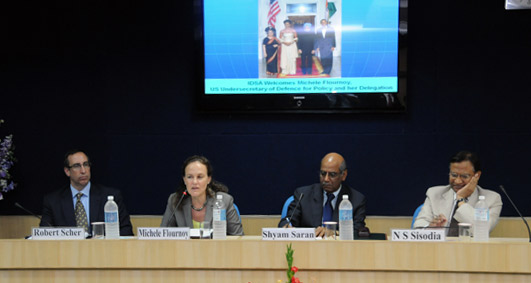
- This event has passed.
Round Table with Ms Michele Flournoy, US Undersecretary of Defence for Policy
August 10, 2010

US Undersecretary of Defence for Policy, Michele Flournoy today delivered an address at IDSA on India-US strategic partnership and participated in the interactive session that followed with the scholars of the institute and select invitees. In her opening address, she underlined the importance of India in solving both regional and global problems. The depth of the partnership could be gauged from the pace at which the strategic partnership has progressed she added.
She reiterated that the US was committed to a long-term strategic partnership with India as the interests of both nations converged over a wide spectrum. These ranged from Afghanistan, Pakistan, the Indian Ocean region, interests in the global commons, among others. Flournoy asserted that India was an indispensable partner to realising the US’s regional and global strategic objectives. Referring to the concerns expressed in New Delhi on the commitment of the Obama administration to further strengthening the relationship, Ms. Flournoy assured the audience that the present administration is as committed as the previous administrations in furthering the partnership.
Speaking on Afghanistan, Ms. Flournoy clarified that July 2011 was not a withdrawal point for US forces from that country but an ‘inflection point’ which indicated that the ongoing surge of US troops will end. She added that the US will continue to be heavily engaged even beyond that point. In this context, she appreciated India’s constructive role in providing developmental assistance and acknowledged the sacrifices made by Indian personnel while carrying out their activities.
Ms. Flournoy stated that the US was trying to build trust with the Pakistani leadership and that there has been an increased commitment from that leadership to combat extremism which has begun to haunt them as well. She added that the defence equipment the US was providing Pakistan like F-16 aircraft was being used in counter-insurgency and counter-terrorism campaigns.
The Indian Ocean region according to her was an important area of US strategic interest, as noted in the Quadrennial Defence Review 2010. These were also the waterways on which India depended for her energy imports. China in recent past was also evincing a keen interest in the Indian Ocean. On China specifically, Ms. Flournoy stated that the US was watching its rise with great interest. While seeking a positive, cooperative relationship with China, the US was also encouraging it to be more transparent in its strategic goals.
Ms. Flournoy noted that in order to deal with trans-national threats like the proliferation of weapons of mass destruction and maritime security, cooperative, multi-lateral approaches would be useful. In this regard, she pointed out the efficacy of such multi-lateral responses like the post-2004 Tsunami rescue efforts. She concluded by emphasising the need for India and the US to capitalise on the remarkable progress made so far in the bilateral relationship. She called for a better understanding of each other’s processes and procedure in the defence field in order to further strengthen defence cooperation. Another aspect could be for both the countries to make operational cooperation procedures to undertake high-seas patrolling for instance.
Concluding her remarks, Ms. Flournoy stated that given that India and the US share a deep commitment to long-term cooperation, both the countries can form an enduring partnership to increase peace and security both regionally and globally.
In the Q&A, members of the audience raised questions about the continuing US arms supplies to Pakistan and the negative effect of such a policy on the security situation in the sub-continent. Ms. Flournoy stated that the US was mindful of such concerns. She however reiterated that US arms were primarily intended to assist that country in dealing with the menace of terrorism.
On Iran, she stated that India and the US shared the same objective on not wanting to see a nuclear-armed country but may be differed on the way to achieve that objective. She reiterated that the prospects of dialogue and negotiation with the Iranian regime were open and that the US was forced to follow the sanctions path given the Iranian intransigence in not fulfilling their international obligations.
She held out the prospects of greater cooperation in the defence realm between India and the US and pointed out that over 90 per cent of license requests from India were approved. She however acknowledged that the US export control system was cumbersome, antiquated and needed to change in order to accommodate the changing US security interests.
Ms. Flournoy informed the audience that the US was aware of ‘seam’ issues between the Central Command and Pacific Command and India’s concerns in the matter. She added that new commanders at both these commands would address the issue actively.
On Afghanistan, Ms. Flournoy stated that the building up of capacities of Afghan security forces was of prime importance. She also reiterated the importance of more representation in governmental structures by all sections of the Afghan society in order to address the root causes of the problem in that country.
In reply to a question, Ms. Flournoy reiterated that the US was concerned about both the intentions as well as capabilities of China, specifically their anti-ship missiles, ASAT weapons, cyber capabilities, among others. She pointed out that the Chinese were indulging in assertive behaviour in the South China Sea, which was unsettling its neighbours.
N.S. Sisodia, Director General, IDSA, introduced Ms. Flournoy and thanked her for sharing her thoughts on the India-US bilateral relations. Amb. Shyam Saran, chaired the session.
Report prepared by S. Samuel C. Rajiv, Associate Fellow, IDSA.







